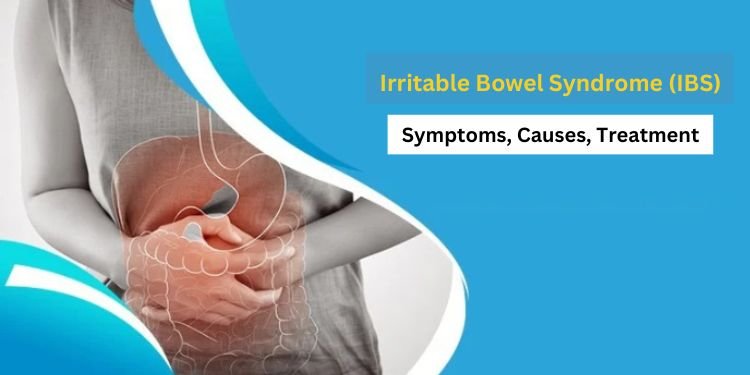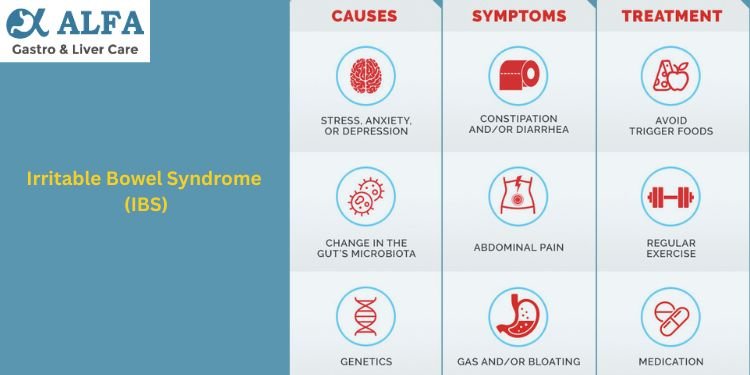Irritable Bowel Syndrome (IBS) – Symptoms, Causes, Treatment

Irritable Bowel Syndrome (IBS) is a common gastrointestinal disorder that affects millions of people worldwide. While it doesn’t pose a serious threat to life, it can significantly impact one’s quality of life. In this blog post, we will delve into the symptoms, causes, and treatment options for IBS, helping you better understand this condition and how to manage it effectively.
Symptoms of IBS
IBS is characterized by a range of symptoms that can vary in severity from person to person. Common symptoms include:
Abdominal Pain:
Individuals with IBS often experience cramp-like abdominal pain, which may be relieved after passing stool.
Bloating:
Excessive gas production and difficulty in passing gas can lead to uncomfortable bloating.
Diarrhea:
Some people with IBS primarily experience diarrhea, leading to frequent and urgent bowel movements.
Constipation:
Others may have constipation, which can cause infrequent and difficult-to-pass stools.
Alternating Bowel Habits:
IBS sufferers may switch between diarrhea and constipation, known as IBS-D (diarrhea-predominant) and IBS-C (constipation-predominant), respectively.
Mucus in Stool:
Mucus in the stool is another common symptom of IBS.
Incomplete Evacuation:
A feeling of incomplete bowel movements is often reported.
It’s essential to note that IBS symptoms can overlap with other gastrointestinal conditions, so it’s crucial to consult a healthcare professional for a proper diagnosis.
Causes of IBS
The exact cause of IBS remains unknown, but several factors are believed to contribute to its development:
Gut Sensitivity:
People with IBS may have an overly sensitive or reactive gut, leading to abnormal responses to normal digestive processes.
Muscle Contractions:
Abnormalities in the rhythmic contractions of the intestinal muscles can result in IBS symptoms.
Nervous System Dysfunction:
The communication between the brain and the gut may be disrupted in individuals with IBS, leading to abnormal sensations and responses.
Inflammation:
Low-grade inflammation in the intestines is a possible factor, though it’s not present in all cases of IBS.
Bacterial Overgrowth:
An imbalance of gut bacteria may contribute to IBS symptoms in some individuals.
Diet and Stress:
Dietary choices and stress can exacerbate IBS symptoms, but they are not considered primary causes.
Treatment Options for IBS
While there is no known cure for IBS, several treatment options can help manage its symptoms effectively:
Dietary Modifications:
Many individuals find relief by identifying and avoiding trigger foods. Common triggers include spicy foods, caffeine, alcohol, and certain artificial sweeteners. A high-fiber diet may help with constipation-predominant IBS.
Medications:
Your healthcare provider may recommend medications such as antispasmodics, laxatives, or anti-diarrheal drugs to alleviate specific symptoms.
Probiotics:
Probiotic supplements can help restore a healthy balance of gut bacteria and alleviate some IBS symptoms.
Stress Management:
Learning stress-reduction techniques, such as yoga, meditation, or cognitive-behavioral therapy, can be beneficial for managing IBS.
FODMAP Diet:
Some individuals with IBS-D benefit from following a low-FODMAP diet, which restricts certain types of carbohydrates that can trigger symptoms.
Prescription Medications:
In severe cases, your healthcare provider may prescribe medications like tricyclic antidepressants or newer medications targeting gut hormones.
Lifestyle Changes:
Maintaining a regular exercise routine, getting enough sleep, and staying hydrated can all contribute to managing IBS symptoms.
Conclusion
Irritable Bowel Syndrome is a chronic condition that requires ongoing management. By understanding its symptoms, causes, and available treatments, you can work closely with your healthcare provider to develop a personalized approach to managing your IBS and improving your overall quality of life. Remember that IBS is a manageable condition, and with the right strategies, you can find relief from its symptoms.
Do you find yourself grappling with IBS and persistent constipation? Take the first step towards relief by scheduling an appointment with us. Dr. Vatsal Mehta, renowned in Ahmedabad for comprehensive gastroenterological and liver treatments, is here to help you find relief.

